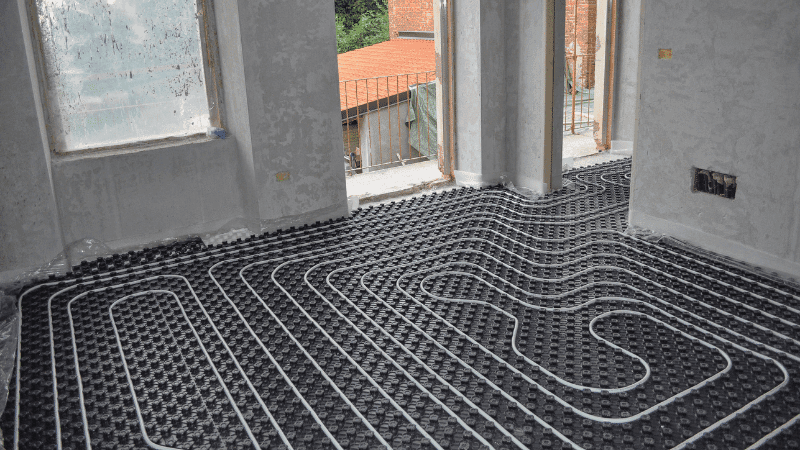How to buy a radiant heating system

Radiant heating is a great option for homeowners — whether you’re building a new house or retrofitting your existing home. This style of heating is discrete and efficient. But it can be costly to install.
If you’re wondering how to buy a radiant heating system, your best bet is to work with an HVAC contractor who specializes in radiant heating.
Connect me with a radiant heating specialist now 🔥
Yes, please!
Things to consider before you buy radiant heating
| 💰 It’s expensive | Radiant systems cost a lot upfront, though they may help you save money on heating long-term. |
| 🔨 It’s hard to install | It’s best to install radiant heating in a new build or during a major renovation. Installation costs are high, as the work is difficult. |
| 🚫 It may void your flooring warranty | If the flooring material you’ve purchased comes with a warranty, check it before installing radiant flooring. |
| 🛀 It’s best for small spaces | Radiant heating is not a great option for heating your whole home. It’s best in targeted rooms, like in your bathroom, where tiles are cold in the winter. |
| ❄️ It’s not ideal for humid climates | Radiant heating doesn’t dry the air like a furnace does. If you live in a humid climate, you’ll need to add supplemental dehumidifiers and fans to rooms with radiant heating. |
Radiant heating options
When shopping for a radiant heating system, you’ll need to weigh the following options.
Hydronic vs. electric
Hydronic and electric are the two most popular types of radiant heating systems.
Hydronic systems rely on hot water to circulate heat. They pump hot water from your boiler through a series of tubes. The heat from the water is transferred to your radiant heating panels or floor.
If you don’t already heat your home with a boiler, it might not make sense to invest in a hydronic system.
An electric radiant heating system doesn’t use water and can be installed without a boiler. It uses wires or conductive mesh to spread heat.
Radiant air heating is another option. It’s not as popular and considered by most heating pros to be inefficient.
Thermal mass
Thermal mass is the metric that dictates how well a material stores and radiates heat. Building materials with a demonstrably high thermal mass include concrete, tile, sand, and special paneling made specifically for radiant heating surfaces.
Budgetary constraints and personal preference may dictate what thermal mass materials you use. Keep in mind that you want your flooring to conduct and radiate the heat energy, not insulate it.
Panel vs. floor heating
Next, you must determine from where your heat should emanate. Radiant heating systems come in one of two varieties:
- Standard radiant heating systems that use wall or ceiling panels to disseminate heat
- Radiant floor heating systems that transfer heat to conductive flooring materials
Even though hot air rises, remember that radiant heating doesn’t move using the air and can therefore come from any direction. If you have carpet on the floor or you want to bring more heat into an addition, it might make sense to put the radiant system in the walls.
If budgeting is your primary concern, radiant ceiling panels are the easiest and cheapest to install.
Get a quote for radiant heating.
Book an appointment
How radiant heating works
Radiant heating works without ductwork or a fan by applying heat directly to specially designed equipment in the walls, ceiling, or floors.
Radiant heating can be adapted to use any common fuel source already present in a house, including boilers, heat pumps, active solar heat, and electric heating.
The primary division among radiant heating methods lies in the use of either water-filled tubing or an electric thermal mass heater.
A purely electric system, which uses plates or conductive mesh embedded in a heat-retaining material such as concrete or tile, is simple and effective but can be more expensive to implement and maintain. The cheaper solution is a hydronic system, which pumps hot water through tubes.
For more information, including costs and installation methods, check out this helpful piece on radiant heating.
How to buy a radiant heating system: the final word
Our experts say the two biggest variables to consider when choosing a radiant heating system are:
- Your budget
- The fuel sources already available in your home
Always engage an HVAC professional when purchasing a new radiant heating system. It’s definitely not a DIY job!
Our network of top-rated heating technicians can help you choose a radiant heating system. Schedule a consultation.
Yes, please!